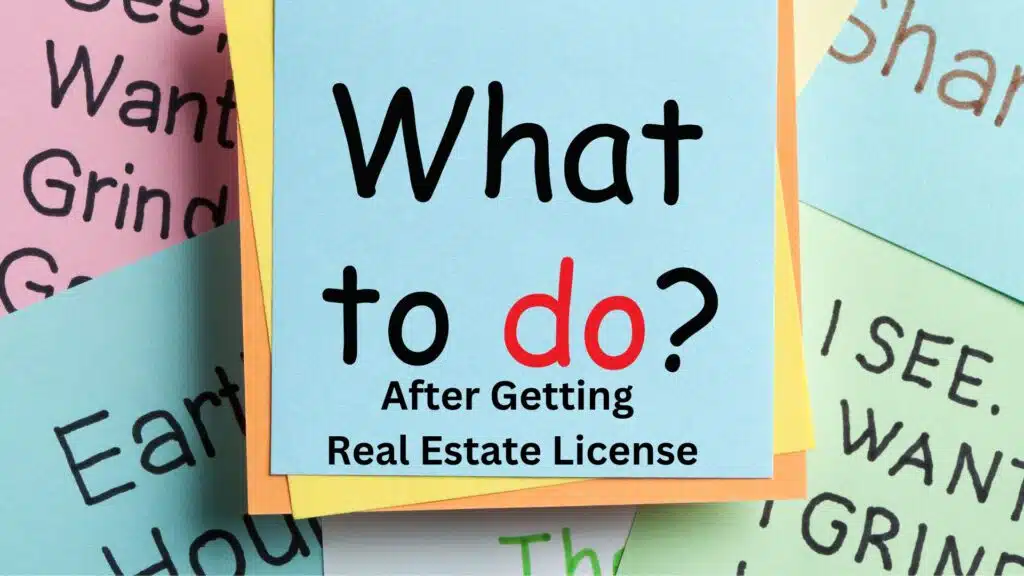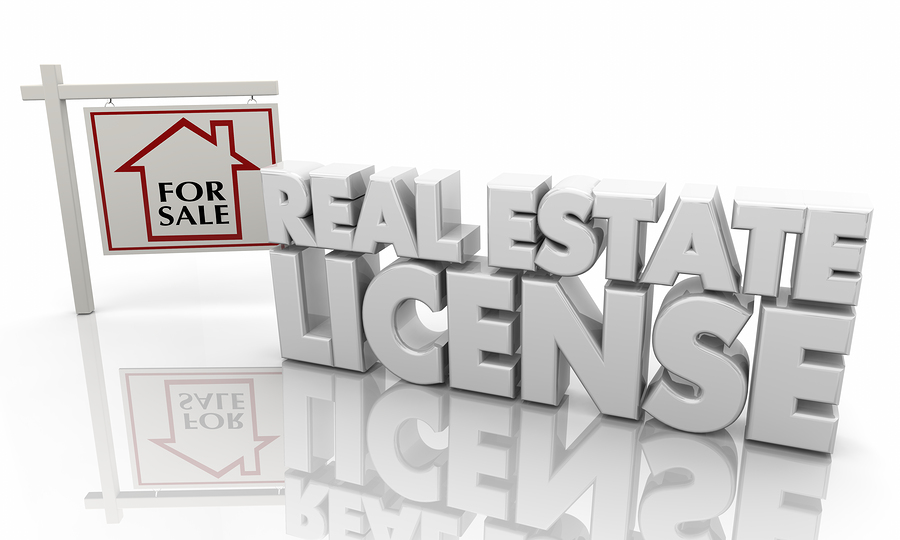Join a brokerage and start networking immediately after getting your real estate license. Building relationships is crucial for success.

What to Do After Getting Real Estate License? Earning a real estate license is a significant achievement, but it’s only the beginning. New agents must join a reputable brokerage to gain essential support and resources. Networking plays a vital role in establishing a presence in the market. Attend industry events, join local real estate associations, and connect with experienced agents.
Developing strong relationships can lead to valuable referrals and partnerships. Utilize social media and online platforms to enhance visibility and attract potential clients. With dedication and strategic actions, new real estate agents can build a thriving career.

Credit: realestateu.com
What to Do After Getting Real Estate License? 9 Steps for Success
1. Celebrate Your Achievement
Getting your real estate license is a huge milestone. You’ve worked hard to reach this point. It’s important to take a moment to celebrate your achievement. This will motivate you for future success.
Acknowledge Your Hard Work
Take a moment to reflect on your journey. Think about all the hours you spent studying. Remember the sacrifices you made along the way. You deserve to feel proud.
- Reflect on the challenges you overcame.
- Think about the new skills you acquired.
- Consider the growth you experienced during this journey.
Recognizing your efforts will boost your confidence. It will prepare you for the next steps in your career.
Share The News
Let everyone know about your accomplishment. Sharing your success can be very rewarding.
- Post on social media platforms.
- Send emails to friends and family.
- Update your professional profiles like LinkedIn.
Sharing your achievements can bring you support and encouragement. It can also help you network with potential clients and colleagues.
Consider hosting a small celebration. Invite people who support you along the way. This can strengthen your relationships and create new opportunities.
2. Join A Brokerage
After you get your real estate license, the next step is to join a brokerage. A brokerage is where you will work under an experienced broker. This can help you learn the ropes and start your career on the right foot.
Research Potential Brokers
Start by researching potential brokers in your area. Look for brokers with a good reputation. Check online reviews and ratings. Ask for recommendations from other real estate agents.
- Check broker’s website for more information.
- Look at their training programs.
- See if they have a strong support system.
Interview With Brokers
Schedule interviews with a few brokers. Prepare a list of questions to ask. Find out about their commission structure. Ask about the support they offer to new agents.
- What is the commission split?
- Do they offer training programs?
- What technology do they provide?
Choose The Right Fit
After your interviews, choose the broker that feels like the best fit. Consider the support and training they offer. Think about their culture and values. Choose a place where you feel comfortable and supported.
| Criteria | Importance |
|---|---|
| Training Programs | High |
| Commission Split | Medium |
| Support System | High |
| Brokerage Culture | High |
Choose wisely and start your real estate career strong!
3. Create A Business Plan
After receiving your real estate license, the next step is to create a solid business plan. A well-thought-out plan will help guide your career. It will set the foundation for success in the competitive real estate market.
Set Goals
Start by setting clear and achievable goals. These goals should be specific, measurable, attainable, relevant, and time-bound (SMART). For example:
- Sell five homes in the first six months.
- Build a client base of 50 contacts within one year.
- Earn $100,000 in commission by the end of the first year.
Writing down your goals will give you a clear path to follow. It will also help you stay motivated.
Identify Target Market
Next, identify your target market. Who are your ideal clients? Think about:
- Age group
- Income level
- Location preferences
- Type of property (e.g., residential, commercial)
Understanding your target market helps you tailor your marketing efforts. It will make your strategies more effective.
Outline Marketing Strategies
Now, outline your marketing strategies. These strategies will help you reach your target market. Consider the following:
- Online Presence: Create a professional website and social media profiles.
- Content Marketing: Write blogs, create videos, and share industry news.
- Networking: Attend local events, join real estate groups, and connect with other agents.
- Advertising: Use online ads, print media, and local sponsorships.
A mix of online and offline strategies will maximize your reach. Be consistent with your marketing efforts.
Here is a simple table to summarize your business plan steps:
| Step | Action |
|---|---|
| Set Goals | Define specific, measurable, and time-bound objectives. |
| Identify Target Market | Determine the demographics of your ideal clients. |
| Outline Marketing Strategies | Plan your online and offline marketing tactics. |
Creating a business plan takes time and effort. But it is essential for building a successful real estate career. Follow these steps to set a strong foundation.

Credit: www.youtube.com
4. Build Your Brand
After getting your real estate license, building your brand is crucial. A strong brand attracts clients and sets you apart. Focus on creating a unique identity in the market.
Design A Logo
Your logo is the face of your brand. A well-designed logo is memorable and professional. It should reflect your values and services. Consider hiring a graphic designer for a polished look.
- Keep it simple and clean.
- Use colors that represent trust and reliability.
- Ensure it looks good in black and white.
Create A Professional Website
A professional website is essential for your online presence. It showcases your listings, services, and contact information. Make sure your website is easy to navigate and mobile-friendly.
| Feature | Importance |
|---|---|
| Responsive Design | High |
| SEO Optimization | High |
| Fast Loading Speed | Medium |
Include a blog section to share real estate tips and updates. This helps in driving organic traffic to your site.
Establish Social Media Presence
Social media is a powerful tool for real estate agents. It helps you connect with potential clients and showcase your expertise. Be active on platforms like Facebook, Instagram, and LinkedIn.
- Create professional profiles on key platforms.
- Share high-quality photos of your listings.
- Engage with your followers by responding to comments.
Use hashtags related to real estate to increase visibility. Posting regularly keeps your audience engaged and interested.
5. Network With Professionals
Congratulations on getting your real estate license! Now, it’s time to network with professionals to grow your career. Building connections can open doors to new opportunities. It can also help you stay updated with industry trends.
Attend Industry Events
Industry events are a great place to meet other real estate agents. They are also useful for learning new skills.
- Look for local real estate conferences
- Attend workshops and seminars
- Participate in trade shows
These events can help you build relationships with experienced agents. You can also get advice from industry experts.
Join Real Estate Associations
Joining real estate associations is another way to expand your network. Many associations offer resources and support for new agents.
- Consider joining the National Association of Realtors (NAR)
- Look into state and local real estate associations
- Participate in their events and meetings
Being part of an association can give you access to valuable tools and information. It also shows clients you are dedicated to your profession.
Connect With Local Businesses
What to Do After Getting Real Estate License? Building relationships with local businesses can also help your real estate career. These connections can lead to referrals and partnerships.
- Introduce yourself to local mortgage brokers
- Connect with home inspectors
- Network with contractors and builders
Working closely with these professionals can provide a well-rounded service to your clients. It can also help you gain more business.
6. Continue Education
After obtaining your real estate license, the journey doesn’t stop there. Continuing education is a crucial step to stay competitive and knowledgeable in the industry. Here are some essential steps to enhance your skills and knowledge.
Enroll In Advanced Courses
What to Do After Getting Real Estate License? One way to boost your expertise is to enroll in advanced courses. These courses offer in-depth knowledge on various aspects of real estate.
- Commercial real estate
- Property management
- Real estate investment
Advanced courses help you specialize and stand out. They also provide you with the latest tools and strategies. This makes you more efficient and effective in your job.
Stay Updated With Market Trends
Staying updated with market trends is essential. The real estate market is constantly changing. Keeping up with trends helps you make better decisions.
Here are some ways to stay updated:
- Subscribe to real estate newsletters
- Follow industry blogs and forums
- Attend webinars and conferences
Staying informed helps you provide better advice to clients. It also keeps you ahead of the competition.
Learn About Legal Requirements
Understanding legal requirements in real estate is vital. Laws and regulations can change frequently.
Here are some key areas to focus on:
| Area | Description |
|---|---|
| Fair Housing Laws | Ensure non-discriminatory practices |
| Contract Law | Know how to draft and review contracts |
| Property Disclosures | Understand mandatory disclosures |
Learning these legal aspects helps you avoid costly mistakes. It also builds trust with your clients and ensures smooth transactions.
7. Develop Client Relationships
After earning your real estate license, it’s crucial to develop strong client relationships. Building trust and rapport with your clients will help you grow your business. Here are key strategies to consider:
Provide Excellent Customer Service
Excellent customer service sets you apart. Always respond quickly to client inquiries. Be polite and professional in all communications. Address client concerns with empathy and offer solutions. Show clients that you genuinely care about their needs.
- Respond to emails and calls promptly.
- Be punctual for all meetings and appointments.
- Listen actively and address client concerns.
- Provide clear and helpful information.
Follow Up With Leads
Don’t let potential clients slip away. Follow up with leads diligently. Use a CRM (Customer Relationship Management) system to track your interactions. Send thank you notes or emails after meetings. Keep in touch with periodic updates.
- Use a CRM to organize your leads.
- Send personalized follow-up messages.
- Offer additional information or resources.
- Schedule follow-up calls or meetings.
Ask For Referrals
Referrals can boost your business. Ask satisfied clients to refer you to others. Make it easy for them by providing referral cards or links. Offer a small incentive for referrals if possible.
| Action | Details |
|---|---|
| Ask for Referrals | Request referrals from happy clients. |
| Provide Referral Cards | Give clients cards with your contact information. |
| Offer Incentives | Provide a small gift or discount for referrals. |

Credit: remindermedia.com
8. Utilize Technology
What to Do After Getting Real Estate License. After getting your real estate license, embracing technology can boost your success. Modern tools can streamline tasks, improve client interactions, and enhance marketing efforts. This section explores how you can harness technology to your advantage.
What to Do After Getting Real Estate License: Use Real Estate Apps
Real estate apps can help you stay organized and efficient. Here are some popular options:
- Zillow: Track listings and market trends easily.
- Redfin: Access home data and client reviews quickly.
- Realtor.com: Find up-to-date property information.
These apps provide instant access to property details and client needs. They can save you time and improve your service quality.
Leverage Crm Software
What to Do After Getting Real Estate License. Customer Relationship Management (CRM) software is crucial for managing client interactions. Top CRM tools for real estate include:
| CRM Tool | Key Features |
|---|---|
| HubSpot | Lead tracking, email templates, and sales pipeline. |
| Zoho CRM | Automation, analytics, and mobile access. |
| Salesforce | Customizable dashboards, reports, and integrations. |
CRM software helps you stay connected with clients and manage your sales pipeline. It can automate tasks and provide valuable insights.
Explore Virtual Tour Tools
Virtual tour tools can showcase properties in a dynamic way. Some popular options are:
- Matterport: Create immersive 3D property tours.
- iStaging: Offer virtual reality home tours.
- EyeSpy360: Provide 360-degree panoramic views.
These tools let potential buyers explore properties remotely. Virtual tours can attract more clients and close deals faster.
9. Monitor Your Progress Final Step For What to Do After Getting Real Estate License
After getting your real estate license, monitoring your progress is crucial. This helps you understand your growth and identify areas needing improvement. Regularly checking your performance ensures you stay on track and meet your goals.
Track Sales And Listings
Start by keeping a detailed record of all your sales and listings. Use a spreadsheet or CRM software to log each transaction. Note the date, property details, and final sale price. Tracking this information helps you see patterns and trends in your business. This data is valuable for forecasting future sales and understanding your market better.
| Sale Date | Property Details | Final Sale Price |
|---|---|---|
| 2023-01-15 | 123 Maple St, 3 bed, 2 bath | $350,000 |
| 2023-02-20 | 456 Oak St, 2 bed, 1 bath | $250,000 |
What to Do After Getting Real Estate License: Evaluate Marketing Efforts
Assess the effectiveness of your marketing campaigns. Check which methods bring the most leads. Review metrics such as website traffic, social media engagement, and email open rates. This information helps you understand which strategies are working. Focus on what brings the best results and refine your tactics accordingly.
- Website Traffic
- Social Media Engagement
- Email Open Rates
Adjust Strategies As Needed
Be prepared to adjust your strategies based on your findings. If a marketing tactic isn’t working, try a different approach. Stay flexible and willing to adapt. Regularly updating your strategies keeps your business dynamic and competitive. This ensures you continue growing and achieving your goals.
- Identify underperforming tactics.
- Research new methods.
- Implement changes gradually.
Monitoring your progress is essential for long-term success in real estate. By tracking sales, evaluating marketing efforts, and adjusting strategies, you stay ahead of the competition.
Conclusion
Securing your real estate license is just the beginning. Continuously educate yourself and network with industry professionals. Stay updated on market trends and technology. Build a strong online presence to attract clients. Success in real estate requires dedication, persistence, and ongoing learning.
Start your journey today and watch your career flourish.
FAQs For What to Do After Getting Real Estate License
What Happens After You Pass Your Texas Real Estate Exam?
After passing your Texas real estate exam, submit your license application. Then, complete fingerprinting and background check. Once approved, you can start practicing real estate.
What Is The Fastest Way To Get Your Real Estate License In Texas?
Complete the required 180 hours of pre-licensing education online. Pass the Texas real estate exam. Submit your license application.
How Long Does It Take To Get Your Real Estate License In Texas?
It typically takes 4-6 months to get a real estate license in Texas. This includes completing 180 hours of coursework.
Is The Texas Real Estate Exam Hard?
Yes, the Texas real estate exam can be challenging. Preparation and study are essential for passing. Many find it difficult.






